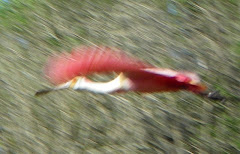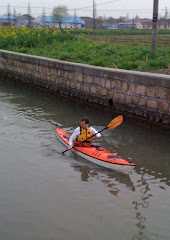If you spend much time on the water in a kayak or canoe, sooner
or later you’re likely to be transfixed by reflections. Sitting so low in a
kayak, reflections dominate your view of calm water from even quite close to
where you sit. It’s easier to see beneath the surface by looking straight down but
in the wider view, without polarized sunglasses, then reflections
rule. All that lies beneath the silvered surface is rendered largely invisible.
 |
| Freeways cross over water Seattle |
Trees and branches overhanging rivers and canals, create scenes of pleasing symmetry. There is a similar visual tunnel effect between the two images below despite their very different locations, France and Missool, Raja Ampat.
Some reflections appear more constructed than others. The
bold reflected shapes beneath bridges with pillars arches and girders, quiver and
gently distort as ripples move between the solid structures. I am left with the
impression the solid structure exists beneath me, no matter what the actual depth is,
or the real nature of the bottom. (for explanation of the green water color, see my
Color of Water blog post)
 |
| Illusion of underwater dock construction, Seattle |
Neither can I resist an opportunity to pause in the face of semicircular
arches that are sucked into visual tubes by reflection. Do the curves really continue
beneath the surface? Is this structure a tube, or is that just an illusion? The real
bottom may be flat, and just beneath the surface, but it’s difficult to discard
the impression that it follows the shape and depth of a tube.
Reflected, concrete girders under a freeway that offer
nesting shelter for pigeons and surfaces for clandestine graffiti scribblers
create optical illusions of solid structures just beneath the placid surface,
but as soon as the surface is disturbed the structures morph into dizzily
shifting curlicue patterns.
 |
| Reflected Girders beneath freeway |
 |
| Girders reflected in wavelets |
 |
| Closer view of reflected girders in wavelets |
The eye sees and the mind attempts to make order of the subtly
shifting patterns. Only by taking a snapshot of the reflections does it become easier to see why the patterns are so challenging to follow. Even in a snapshot
the crisscrossing wave patterns form such twisted reflections that seen out of context
they illustrate a puzzling reality. Serving as Rorschach ink blots, the frozen
shapes can conjure all manner of things, but rarely reveal the original object
that was reflected. When the image is rapidly moving, what chance do you have
of making sense of the shifting tree-ring patterns?
 |
| wavelets create tree-ring style patterns |
Ripples in motion
Stainless steel anchors, anchor pockets and scratch plates
on ship hulls contrast the warping mirror of water, offering steadier mirrored
surfaces. Just as from a flat-water surface an individual facet will reflect simply. However, multifaceted surfaces shatter reflections in a completely different way to
water, creating collages of recognizable reflected bits of the surroundings.
 |
| Collage of reflections around anchor |
Water does something similar, but the effect is repeated many
more times over by the procession of ripples each presenting its own set of constantly
changing reflections from its uniquely morphing three-dimensional curves. Small
undulations across an otherwise smooth surface cause shifting curvilinear shapes;
shapes that are echoed in art including art from Papua.
 |
| Surreal abstract patterns of reflection in water |
Although bridges and tunnels and docks offer some amazing reflections,
there’s little more pleasing to me than cruising across flat water when
the sky is blue with a few fluffy clouds. Looking ahead I have the sensation of
flying high above the clouds, which shape-shift beside me as the wake from my bow warps
the surface. Close beside my craft the reflected clouds seem to fade, and I can see
through them into the water, perhaps seeing fingers of watermilfoil reaching up
toward me, or fish darting away. And there on the surface itself, all around me suspended above the mirrored sky is another world of objects too light to
sink, too heavy to fly. Here are insects that can walk on water. Here are
floating plants, the leaves of waterlilies, feathers and twigs.
If you've enjoyed this blog post, find more of my creations on Nigel Foster YouTube channel, and on nigel foster vimeo. You can find my books on my store. I'm also available for presentations and special kayak instruction.
The kayaks glimpsed in this post are by Nigel Foster (Point65 DoubleShot and Whisky 16 and Seaward Kayaks Legend)













































